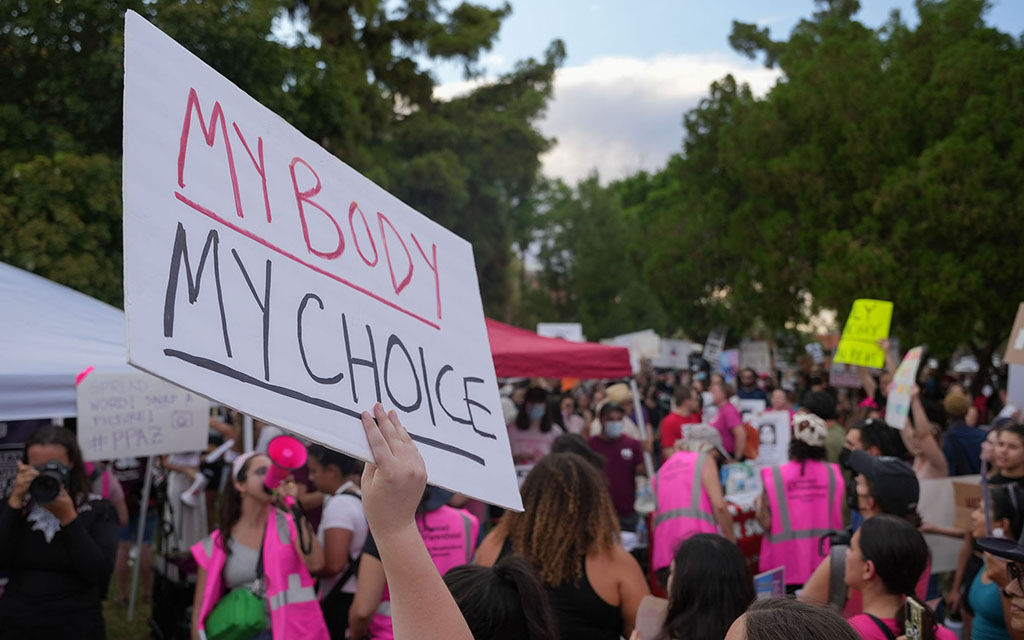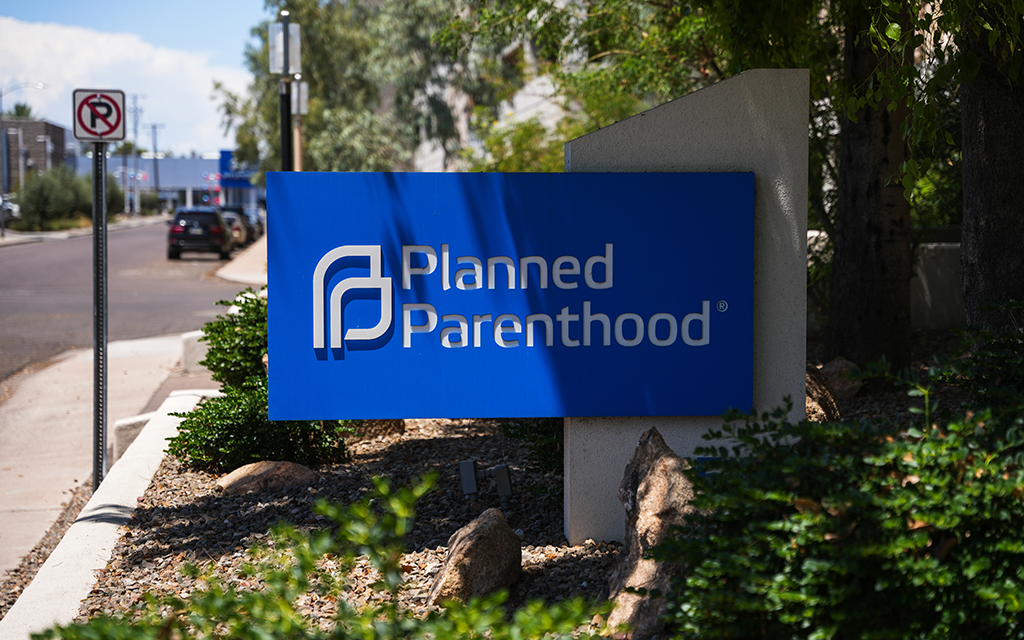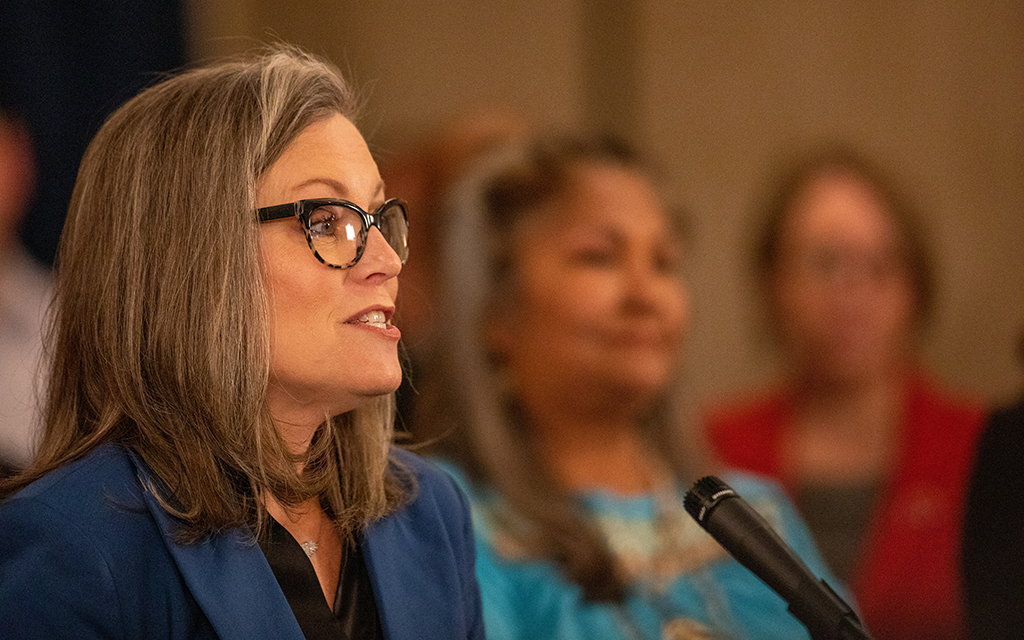
Activists rally at the Arizona Capitol in June 2022, to protest the U.S. Supreme Court’s ruling overturning abortion rights that had been guaranteed in its 1973 Roe v. Wade ruling. Since then, state law has been unsettled, and it took another turn this week when the Arizona Supreme Court agreed to hear a challenge. (File photo by Troy Hill/Cronkite News)
WASHINGTON – Arizona abortion providers said Thursday they will conduct business as usual while the state Supreme Court considers a challenge to state law that could lead to the restoration of a 19th-century ban on abortion.
The court’s announcement Wednesday was the latest in a year of uncertainty for abortion providers in the state since the U.S. Supreme Court last June overturned Roe v. Wade, its 1973 ruling that recognized a right to abortion.
Arizona’s abortion laws have seesawed back and forth since then, as state courts first reinstated and then put on hold the 1864 law that criminalizes abortion in almost all cases. Currently, abortion is legal in the state as long as it is performed by a licensed physician before 15 weeks of pregnancy, under a law passed by the Legislature in 2022.
At Camelback Family Planning, a Valley abortion provider and clinic, administrative assistant Ta’nia Pierre said the clinic strictly follows the current 15-week ban and continues to provide patients with both medical and surgical abortions.
“As of right now we don’t have any concerns, just because we are being positive about it and we know that it’s looking up for us,” Pierre said Thursday.
In a statement late Wednesday in response to the court’s announcement, Planned Parenthood Arizona said it will “remain open and we are committed to protecting abortion access and other essential sexual and reproductive health care services.”
Other abortion providers in the state were not immediately available for comment Thursday on the court’s decision.
The Arizona Supreme Court said Wednesday that it will review a Dec. 30 ruling by the Arizona Court of Appeals that recognized the 15-week ban as the law in the state. It is just the latest turn in a yearlong legal battle over an issue that goes back decades.
Arizona’s 19th-century ban on abortion was put on hold in 1974 by Roe v. Wade. But when Roe was overturned last June by the U.S. Supreme Court’s ruling in Dobbs v. Jackson Women’s Health, then-Attorney General Mark Brnovich went to court to have the injunction lifted on the old Arizona law.
Pima County Superior Court Judge Kellie Johnson agreed in September, saying the 1864 ban took priority. That ruling was swiftly appealed by Planned Parenthood, and the ban was only in effect for two weeks before the Court of Appeals put it on hold, temporarily making abortion legal again in Arizona.
The appellate court ruled in December that physicians who perform abortions under more recent laws cannot be charged under the 19th-century ban. Arizona Attorney General Kris Mayes, who by then had replaced Brnovich, said she would not appeal that ruling.
“While the 15-week ban is far from an ideal status quo, lacking crucial exceptions for rape or incest, it is much preferable to a law passed during the Civil War, before Arizona was a state, and decades before women gained the right to vote,” Mayes said in a statement this week.
Despite Mayes’ decision, anti-abortion groups decided to press their own appeal. Dr. Eric Hazelrigg, an obstetrician and medical director of Choices Pregnancy Centers, was joined by Yavapai County Attorney Dennis McGrane. Both were represented by the legal organization, Alliance Defending Freedom.
Denise Harle, an ADF senior counsel and director of its Center for Life, welcomed the state Supreme Court’s decision to review the lower court’s ruling.

Planned Parenthood said it will continue offering services while the Arizona Supreme Court considers a challenge to the state’s abortion law. (File photo by Troy Hill/Cronkite News)
“Abortion businesses, like Planned Parenthood, prey on women facing unplanned pregnancies and make them feel as if abortion is their only option,” Harle said. “The abortion industry has a financial interest in performing abortions – not providing information and options vital to the health of a woman and her child.”
But Planned Parenthood noted that the court’s decision “says nothing about the merits of the case” and vowed to fight to keep the territorial-era abortion ban off the books.
“This archaic abortion ban the intervenors are trying to revive is cruel, harmful, and unpopular with the majority of Arizonans,” Planned Parenthood spokesperson Kelley Dupps said in a prepared statement. “It has no place dictating our reproductive freedom and how we live our lives today.”
No hearing date had been set for the case, but Cindy Dahlgren, of the conservative Center for Arizona Policy, said her organization is “cautiously optimistic” that the 15-week ban will be reversed by the high court.



